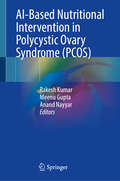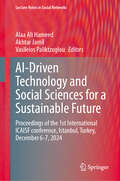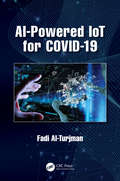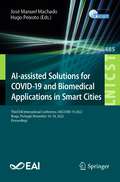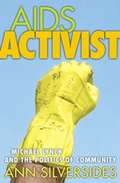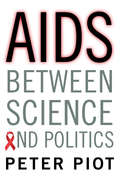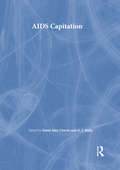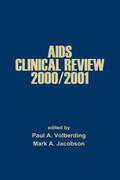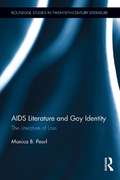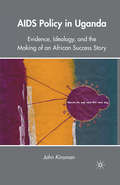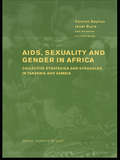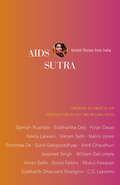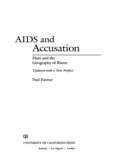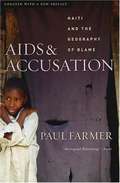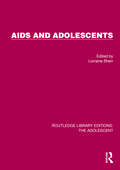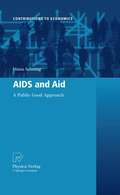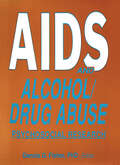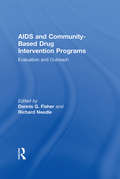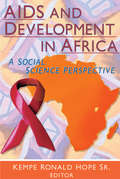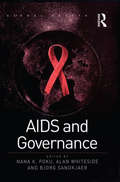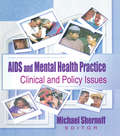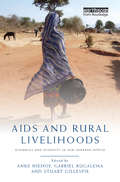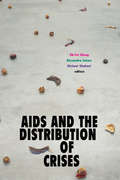- Table View
- List View
AI-Based Nutritional Intervention in Polycystic Ovary Syndrome (PCOS)
by Rakesh Kumar Anand Nayyar Meenu GuptaThis book provides an overview of AI-powered nutritional interventions for the management of Polycystic Ovary Syndrome (PCOS). It focuses on AI-driven diagnostics for swift and accurate PCOS identification, personalized nutrition plans integrating genetic and hormonal data, and behavioral interventions promoting adherence. The book bridges the gap between technological innovation and clinical practice, leading to a new era of precision medicine in women's health. Chapters cover information from AI-tailored nutrition plans to suit individual PCOS profiles to insights into micronutrients, macronutrients, and dietary choices. They also address glycemic control, hormonal balance, and holistic wellness. Further chapters cover the ethical dimensions of AI in healthcare while championing patient empowerment. It also provides real-time monitoring through wearable tech and ethical considerations surrounding AI implementation in healthcare. The book includes real-life success stories, case studies, and practical guidance to aid decision-making. The book is relevant for healthcare professionals, gynecologists, nutritionists, and researchers to harness artificial intelligence’s potential in optimizing women's health and well-being.
AI-Driven Technology and Social Sciences for a Sustainable Future: Proceedings of the 1st International ICAISF conference, Istanbul, Turkey, December 6-7, 2024 (Lecture Notes in Social Networks)
by Akhtar Jamil Alaa Ali Hameed Vasileios PaliktzoglouThis book presents a multidisciplinary exploration of sustainable development, integrating themes such as environmental management, social sciences, and AI-driven technology. It covers innovative approaches to sustainability in agriculture, biodiversity, energy, and urban planning, while addressing social equity, human rights, and the role of education. The book also highlights the impact of AI and technology on public health, resource management, and smart cities, alongside discussions on governance, policy, and ethical dimensions of sustainability. With contributions on economic growth, public health, and environmental justice, it serves as a comprehensive guide for advancing global sustainability initiatives.
AI-Powered IoT for COVID-19
by Fadi Al-TurjmanThe Internet of Things (IoT) has made revolutionary advances in the utility grid as we know it. Among these advances, intelligent medical services are gaining much interest. The use of Artificial Intelligence (AI) is increasing day after day in fighting one of the most significant viruses, COVID-19. The purpose of this book is to present the detailed recent exploration of AI and IoT in the COVID-19 pandemic and similar applications. The integrated AI and IoT paradigm is widely used in most medical applications, as well as in sectors that deal with transacting data every day. This book can be used by computer science undergraduate and postgraduate students; researchers and practitioners; and city administrators, policy makers, and government regulators. It presents a smart and up-to-date model for COVID-19 and similar applications. Novel architectural and medical use cases in the smart city project are the core aspects of this book. The wide variety of topics it presents offers readers multiple perspectives on a variety of disciplines. Prof. Dr. Fadi Al-Turjman received his PhD in computer science from Queen’s University, Kingston, Ontario, Canada, in 2011. He is a full professor and research center director at Near East University, Nicosia, Cyprus.
AI-assisted Solutions for COVID-19 and Biomedical Applications in Smart Cities: Third EAI International Conference, AISCOVID-19 2022, Braga, Portugal, November 16-18, 2022, Proceedings (Lecture Notes of the Institute for Computer Sciences, Social Informatics and Telecommunications Engineering #485)
by José Manuel Machado Hugo PeixotoThis book constitutes the refereed post-conference proceedings of the Third International Conference on AI-assisted Solutions for COVID-19 and Biometrical Applications in Smart Cities, AISCOVID-19 2022, held in November 2022 in Braga, Portugal. The 8 full papers of AISCOVID-19 2022 were carefully selected from 21 submissions and present a comprehensive and up-to-date look at the intersection of COVID-19, big data, machine learning, deep learning, and healthcare. The theme of AISCOVID-19 2022 was Healthcare effective and efficient Solutions for COVID-19 that can be achieved using Artificial Intelligence and Computer-Assisted paradigms.
AIDS Activist: Michael Lynch and the Politics of Community
by Ann SilversidesMichael Lynch, the central figure of this book, was a long-time gay activist and a dynamic force in organizing an early response to the AIDS epidemic. Lynch’s prescient articles in The Body Politic spoke to the gay communities of Toronto, New York, and San Francisco. His organizing efforts meant change and hope. AIDS Activist is a crisp and passionate introduction to a wide range of issues. Focusing on personal stories Silversides furnishes a snap-shot history of how the AIDS crisis unfolded and some of the heroic responses to it. Her emphasis on the politics of the gay community response makes this book unique.
AIDS Between Science and Politics: A Selection From Aids Between Science And Politics (To The Point Ser.)
by Peter PiotPeter Piot, founding executive director of the Joint United Nations Programme on HIV/AIDS (UNAIDS), recounts his experience as a clinician, scientist, and activist fighting the disease from its earliest manifestation to today. The AIDS pandemic was not only catastrophic to the health of millions worldwide but also fractured international relations, global access to new technologies, and public health policies in nations across the globe. As he struggled to get ahead of the disease, Piot found science does little good when it operates independently of politics and economics, and politics is worthless if it rejects scientific evidence and respect for human rights. <P><P>Piot describes how the epidemic altered global attitudes toward sexuality, the character of the doctor-patient relationship, the influence of civil society in international relations, and traditional partisan divides. AIDS thrust health into national and international politics where, he argues, it rightly belongs. The global reaction to AIDS over the past decade is the positive result of this partnership, showing what can be achieved when science, politics, and policy converge on the ground. Yet it remains a fragile achievement, and Piot warns against complacency and the consequences of reduced investments. He refuses to accept a world in which high levels of HIV infection are the norm. Instead, he explains how to continue to reduce the incidence of the disease to minute levels through both prevention and treatment, until a vaccine is discovered.
AIDS Capitation
by David A CherinDiscover effective strategies for AIDS healthcare!You’ll definitely want to see what’s documented inside AIDS Capitation if you’re affiliated in any way with current efforts to bolster and improve healthcare policies and procedures for AIDS victims and their families. With this scholarly, up-to-date guidebook, you’ll find that your awareness and knowledge base concerning contemporary AIDS healthcare issues will expand and diversify, giving you a more stable information base from which you can make your own policy changes and civic organization improvements.If you’re a practitioner in HIV/AIDS care, an academic in HIV/AIDS research, or one of the many public officials currently involved in healthcare reform, you’ll find the guidance and proven strategies you need in AIDS Capitation. AIDS Capitation gives you a broad range of information including: descriptive and evaluative aspects of the model of care directions for implementing an innovative model of terminal home care modalities of care in end-stage treatment measurement issues in evaluative research help in measuring outcomes in community-based care funding opportunitiesWithout a doubt, the onset of HIV/AIDS has changed the way we view life. Our schools, government offices, and healthcare venues must change also. AIDS Capitation has everything you need to begin that process of change in your community.
AIDS Clinical Review 2000/2001 (Aids Clinical Review)
by Mark A. Jacobson Paul A. VolberdingThe latest in the crucial series documenting scientific discoveries at the forefront of HIV and AIDS research!This volume updates the most important and controversial issues facing physicians, nurses, microbiologists, pharmacists, and epidemiologists who deal directly with patients suffering from HIV and AIDS, focusing on specific areas in which important new advances have occurred in diagnosis, therapy, and prevention of infection and related complications.Outlines new disease management strategies being tested in prospective clinical trials and observational studies!Combining elements of virology, epidemiology, immunology, oncology, endocrinology, neurology, psychiatry, and the behavioral sciences, AIDS Clinical Review 2000/2001clarifies substantive advancements in vaccine development, realistically assessing potential efficacy and limitations explores short-term antiretroviral therapy for dramatically reducing the rate of vertical transmission from mother to child evaluates the efficacy of antiretroviral prophylaxis for workers who experience high-risk exposure to HIV-infected blood discusses preservation of HIV specific immunity when antiretroviral therapy is initiated early in the course of acute infection considers complex drug interactions that occur when drugs are used in combination highlights cytokine and other immune-based therapies suggests chronic hepatitis may ultimately be more fatal than HIV for coinfected patients and more!Including results recently presented at scientific meetings but not yet published in peer-reviewed journals, AIDS Clinical Review 2000/2001 is essential reading for infectious disease specialists, epidemiologists, virologists, immunologists, pharmacologists, microbiologists, hematologists, hepatologists, oncologists, neurologists, medical students in these disciplines, and all medical professionals involved in both AIDS.
AIDS Doctors: An Oral History
by Ronald Bayer Gerald M. OppenheimerToday, AIDS has been indelibly etched in our consciousness. Yet it was less than twenty years ago that doctors confronted a sudden avalanche of strange, inexplicable, seemingly untreatable conditions that signaled the arrival of a devastating new disease. Bewildered, unprepared, and pushed to the limit of their diagnostic abilities, a select group of courageous physicians nevertheless persevered. This unique collective memoir tells their story. <p><p> Based on interviews with nearly eighty doctors whose lives and careers have centered on the AIDS epidemic from the early 1980s to the present, this candid, emotionally textured account details the palpable anxiety in the medical profession as it experienced a rapid succession of cases for which there was no clinical history. The physicians interviewed chronicle the roller coaster experiences of hope and despair, as they applied newly developed, often unsuccessful therapies. Yet these physicians who chose to embrace the challenge confronted more than just the sense of therapeutic helplessness in dealing with a disease they could not conquer. They also faced the tough choices inherent in treating a controversial, sexually and intravenously transmitted illness as many colleagues simply walked away. Many describe being gripped by a sense of mission: by the moral imperative to treat the disempowered and despised. Nearly all describe a common purpose, an esprit de corps that bound them together in a terrible yet exhilarating war against an invisible enemy. <p> This extraordinary oral history forms a landmark effort in the understanding of the AIDS crisis. Carefully collected and eloquently told, the doctors' narratives reveal the tenacity and unquenchable optimism that has paved the way for taming a 20th-century plague.
AIDS Drugs for All:
by Joshua W. Busby Ethan B. KapsteinDrawing on a rich set of interviews and surveys, this book shows how the global AIDS treatment advocacy movement helped millions in the developing world gain access to life-saving medication. The movement achieved this by transforming the market for AIDS drugs from one which was 'low volume, high price' to one based on access for all. The authors suggest that a movement's ability to transform markets depends upon whether: (1) markets are contestable; (2) they have framed their arguments to resonate across their target audiences; (3) the movement itself has a coherent goal; (4) the costs are low, or the benefit-to-cost ratio is favourable; and, finally, (5) institutions are present to reward continued achievement of the new market principle. These insights are applied to a range of other cases including malaria, maternal mortality, water/diarrheal disease, non-communicable diseases, education, climate change, the ivory trade, sex trafficking and the Atlantic slave trade.
AIDS Literature and Gay Identity: The Literature of Loss (Routledge Studies in Twentieth-Century Literature)
by Monica B. PearlThis book discusses the significance of late twentieth century and early twenty first century American fiction written in response to the AIDS crisis and interrogates how sexual identity is depicted and constructed textually. Pearl develops Freudian psychoanalytic theory in a complex account of the ways in which grief is expressed and worked out in literature, showing how key texts from the AIDS crisis by authors such as Edmund White, Michael Cunningham, Eve Sedgwick – and also, later, the archives of The ACT UP Oral History Project - lie both within the tradition of gay writing and a postmodernist poetics. The book demonstrates how literary texts both expose and construct personal identity, how they expose and produce sexual identities, and how gay and queer identities were written onto the page, but also constructed and consolidated by these very texts. Pearl argues that the division between realist and postmodern, and gay and queer, respectively, is determined by whether the experience expressed and accounted is mediated through the psychoanalytic categories of mourning or melancholia, and is marked by a kind of coherence or chaos in the texts themselves. This study presents an important development in scholarly work in gay literary studies, queer theory, and AIDS representation.
AIDS Policy in Uganda: Evidence, Ideology, and the Making of an African Success Story
by John KinsmanThis book presents a history of AIDS control in Uganda, from the start of the epidemic in the early 1980s up until 2005. Uganda is well known internationally as an AIDS 'success story', both for its bringing down HIV incidence and prevalence over the 1990s, and for its innovative approach to scaling up the provision of antiretroviral therapy.
AIDS Sexuality and Gender in Africa: Collective Strategies and Struggles in Tanzania and Zambia (Social Aspects of AIDS)
by Janet Bujra Carolyn BayliesWhile there is a growing list of publications devoted to the AIDS epidemic, Africa, with two-thirds of the world's cases, still receives scant attention. This book may change the way we think about AIDS and how it is being addressed in Africa and the rest of the world.The book draws on first-hand research and in-depth investigations carried out by a team of researchers from Britain, Zambia and Tanzania, and focuses on the gendered aspect of the struggle against AIDS.The authors study the severity of the epidemic and the threat it poses to the population and society in Tanzania and Zambia. They argue that the success of strategies against the spread of AIDS in Africa rests on their recognition of existing gendered power relations and that this success might be enhanced if the strategies are built on existing organisational skills and practices, especially among women. Their conclusions have repercussions for all countries around the world, and especially the rest of Africa.
AIDS Sutra: Untold Stories from India
by Amartya Sen Negar AkhaviIn this groundbreaking anthology, sixteen renowned writers tell the hidden story of the AIDS crisis, illuminating the complex nature of one of the major problems facing the developing world. India is home to almost 3 million HIV cases, but AIDS is still stigmatized and shrouded in denial. Discrimination against HIV-affected individuals in hospitals, schools, and even among families is common, just as discussion about HIV and participation in prevention or treatment programs are not. In this riveting book, sixteen of India's most well-known writers go on the road to uncover the reality of AIDS in India and tell the human stories behind the epidemic.Kiran Desai travels to the coast of Andhra Pradesh, where the sex workers are considered the most desirable; Salman Rushdie meets members of Mumbai's transgender community; William Dalrymple encounters the devadasis, women who have been “married” to a temple goddess and thus are deemed acceptable for transactional sex. Eye-opening, hard-hitting, and moving, AIDS Sutra presents a side of India rarely seen before.
AIDS and Accusation
by Paul FarmerDoes the scientific "theory" that HIV came to North America from Haiti stem from underlying attitudes of racism and ethnocentrism in the United States rather than from hard evidence? Award-winning author and anthropologist-physician Paul Farmer answers with this, the first full-length ethnographic study of AIDS in a poor society. First published in 1992 this new edition has been updated and a new preface added.
AIDS and Accusation: Haiti and the Geography of Blame
by Paul FarmerExposes the racism inherent in the now-discredited supposition that AIDS came to the US via Haiti. (It was the other way around.) Award-winning author Paul Farmer, now working in Rwanda, updates this 1992 study with a new preface.
AIDS and Adolescents (Routledge Library Editions: The Adolescent)
by Lorraine SherrOriginally published in 1997, Aids and Adolescents provided an insight into a wide range of adolescent issues which were rarely compiled in one volume at the time. Much of the HIV epidemic response had been at the individual level in the hope that this narrow focus would provide the key to containment and resolution of spread. However, over the ten years since the epidemic had taken hold, it was clear that paradigms were limited, input was uncritical and large cohorts were overlooked. In this text a series of contributions have been compiled to explore adolescent issues ranging from sexual behaviour and health education campaigns to HIV prevention and HIV/AIDS care. The chapters begin by giving an overview of adolescent problems, such as homelessness, pregnancy and gender, and explore why these problems are so often overlooked. We then move on to an examination of the facts and fictions associated with adolescent risk, challenging some of the basic current notions underpinning approaches to the subject at the time. Also included are particular focused studies of Australian adolescents’ beliefs about HIV and STDs and also the American adolescents’ perceptions of drug injection. Finally, the volume gives a focused view of those with HIV infection, with a review of findings of the time, neuropsychological and psychological factors. This overview provided some comments on merging issues and future directions. Today it can be read in its historical context.
AIDS and Aid: A Public Good Approach (Contributions to Economics)
by Diana SonntagThe emerging outlook on the AIDS crisis is bleak; it seems that Millennium Development Goal 6 cannot be achieved in most developing countries by 2015. While most books look at the HIV/AIDS epidemic from an epidemiological point of view, this work evaluates AIDS and the international financing mechanisms of aid from a public good perspective. In contrast to the standard approach of the academic literature on AIDS, which derives policy recommendations from the demand side, this book explicitly considers the supply side. The study does not only advance the public goods literature, it also provides new insights into the effectiveness of international policies and paves the way for policy recommendations. As it reveals the weaknesses of current anti-HIV policies, a more effective allocation of international assistance is postulated.
AIDS and Alcohol/Drug Abuse: Psychosocial Research
by Dennis FisherAIDS is the number one health issue facing the nation today. The way in which AIDS relates to substance abuse is explored by drug abuse researchers in this timely volume. A major focus of AIDS and Alcohol/Drug Abuse is on the problems of conducting AIDS research on racial minorities in this country. Bringing together experts in the field, this volume examines the specific obstacles and challenges researchers have faced in assessing and addressing the needs of underserved populations and maps routes and procedures that can improve both research and available health care services.This unique volume also focuses on aspects of HIV infection that have received little attention elsewhere. It includes the first information published in the open literature about intravenous drug use in Alaska. Another chapter highlights some little-known facts that relate substance abuse to HIV infection in the American Indian/Alaskan Native population, among whom--it has been predicted--a devastating epidemic of HIV infection is likely. Problems with prevention, research, and treatment of individuals who are both intravenous drug users and who are infected with HIV are explored. Other chapters look at the transmission of HIV infection--by gay men who are alcoholics and by intravenous drug users. AIDS and Alcohol/Drug Abuse ends with hopeful chapter for AIDS prevention. Readers interested in the relationship of intravenous drug use and HIV infection, particularly among racial and ethnic minorities, will find this to be a practical, readable book. In particular, substance abuse counselors and researchers, and anyone involved in the AIDS prevention movement will find a valuable wealth of information.
AIDS and Community-Based Drug Intervention Programs: Evaluation and Outreach
by Dennis Fisher Richard NeedleDelve into the uncharted territory of the “hidden” drug addict--users who are not in treatment, not incarcerated, and not officially accessible for research purposes through traditional means. AIDS and Community-Based Drug Intervention Programs describes short-term interventions used to reduce the odds that these drug users will get infected by the Human Immunodeficiency Virus (HIV). The book explains new methods that are being developed, such as targeted sampling, social network analysis, geomapping, and other amalgams of both quantitative and qualitative approaches, that need to be forged to overcome the challenges of the war against AIDS. The research described in this important book was conducted under the Cooperative Agreement for AIDS Community-Based Outreach/Intervention Research funding mechanism of the National Institute on Drug Abuse (NIDA). Chapters include research on several ethnic groups, including Alaska natives, Puerto Ricans, and Navaho teens. AIDS and Community-Based Drug Treatment Programs, written by experts in the field, is a broad-based treatment of the subject by those who are actually doing the work in the trenches. Authors cover topics such as: the use of goal-oriented counseling and peer support to reduce HIV/AIDS risk quantitative and qualitative methods to assess behavioral change among injection drug users (IDUs) the importance of sampling from hidden populations in research a public health model for reducing AIDS-related risk behavior among IDUs and their sexual partners characteristics of female sexual partners of IDUs strategies used to implement random sampling strategies in the recruitment of out-of-treatment crack and IDUs ethnographic analysis of intravenous drug use analysis of contact tracing strategies employed to combat the AIDS epidemic the use of pile sorts to enhance other tools used by drug prevention programsAIDS and Community-Based Drug Intervention Programs is full of current research and useful information for professionals interested in learning about strategies for conducting HIV/AIDS research among hard-to-reach populations. Substance abuse researchers, treatment professionals, and people involved in AIDS prevention programs, state and county health departments, and criminal justice systems will find much relevant and important information to use in their daily work.
AIDS and Development in Africa: A Social Science Perspective (Haworth Psychosocial Issues Of Hiv/aids Ser.)
by R Dennis Shelby Kempe Ronald Hope, SrAIDS and Development in Africa: A Social Science Perspective is the first book-length treatment of both the impact of AIDS in Africa and an assessment of intervention strategies in varying cultural situations. Developed from revised selected papers from the nineteenth Southern African Universities Social Science Conference, AIDS and Development in Africa will be of interest to counselors, medical and development practitioners, Africanists, and AIDS researchers. From this book, you will find wide analytical coverage of the issues and country case studies related to the contributory factors and development impact of the HIV/AIDS pandemic in Africa. You will also explore the ability of countries to willingly promote and cope with the pandemic in the context of their different economic circumstances.Specifically in AIDS and Development in Africa, you will read about: socioeconomic context of AIDS social scientific explanations of the AIDS pandemic in Africa HIV/AIDS and the status of women in Botswana and Swaziland sexual abuse and HIV/AIDS law and HIV/AIDS orphans of the AIDS pandemic media and the African context of social construction human resource development and training in relation to HIV/AIDS in ZambiaAIDS and Development in Africa uses a multidisciplinary social science perspective in case studies of such countries as Botswana, Swaziland, Zimbabwe, South Africa, Malawi, and Zambia to reveal contributory factors and the developmental impact of HIV/AIDS in Africa. This book demonstrates the human consequences of AIDS and the efforts being made by governments, individuals, families, villages, communities, and national government organizations to respond to the pandemic. For example, you will learn about information campaigns and peer education approaches that are successfully increasing transmission awareness and condom use. You will read beyond the usual analysis of demographics and receive much more substantial assessments and analyses of the burden on people, economies, and health care systems of the African countries. AIDS and Development in Africa is indispensable to anyone who is involved with HIV/AIDS prevention/intervention in Africa. This comprehensive book provides you with essential and up-to-date research on the many issues surrounding Africa’s HIV/AIDS pandemic.
AIDS and Governance: Hiv/aids (Global Health)
by Alan WhitesideThe political impact of HIV/AIDS varies greatly and is difficult to map. States depend on how governments choose to manage the political implications of HIV and AIDS, both those stemming from the erosions of its own capacity as well as those that originate from their changing relationship on a national and international level. Across the developing world, HIV/AIDS is slowly killing adults in their most productive years, hollowing out state structures, deepening poverty and raising profound questions that touch on the organization of all aspects of social, economic and political life. With the epidemic showing scant signs of slowing down, this innovative volume assesses how HIV/AIDS affects governance and, conversely, how governance affects the course of the epidemic. In particular, the volume:
AIDS and Mental Health Practice: Clinical and Policy Issues
by Michael Shernoff R Dennis ShelbyAddressing contemporary issues faced by individuals with HIV/AIDS, AIDS and Mental Health Practice: Clinical and Policy Issues provides psychologists, psychiatrists, social workers, and counselors with research and case studies that offers models for effective clinical practice at this stage of the epidemic. Each chapter is written by experts in the field and demonstrates ways to provide better services to different populations, many of whom are ignored in AIDS and mental health literature. As a result, this book will provide professionals in the field and students in training with the most current practice information about mental health practice and HIV/AIDS. AIDS and Mental Health Practice will help you understand the diverse needs of people with HIV/AIDS and organize services to assist these populations. AIDS and Mental Health Practice discusses issues that affect several different groups in order to help you understand the unique situations of your clients. You will learn how to design treatments that will be most beneficial to Latinos, intravenous drug users, orphaned children, African Americans, HIV-negative gay men, HIV nonprogressors, HIV-positive transsexuals, end-stage AIDS clients, couples of mixed HIV status, and individuals suffering from HIV-associated Cognitive Motor Disorder. This book provides you with approaches that will improve services for these populations, including: talking to patients about the positive and negative aspects of taking protease inhibitors and discussing their feelings of hope, skepticism, and fear of being disappointed by the treatment preparing clients to go back to work by exploring the meaning of work and referring them to vocational services if necessary providing support groups for people living with AIDS (PLWAs), their loved ones, their families, and individuals in bereavement as a result of an AIDS-related death organizing a HIV-negative gay men’s support group that uses exercises and homework to focus on the members’ambivalent connection to the AIDS community, how they remain HIV negative, and ways to deal with separation and grief issues assessing and/or correcting underlying racism in AIDS service organizationsThe prevention and intervention strategies in Mental Health and AIDS Practice will help you address and treat mental health issues associated with HIV/AIDS and offer clients more effective and relevant services.
AIDS and Rural Livelihoods: Dynamics and Diversity in sub-Saharan Africa
by Anke Niehof Gabriel RugalemaAIDS epidemics continue to threaten the livelihoods of millions of people in sub-Saharan Africa. Three decades after the disease was first recognized, the annual death toll from AIDS exceeds that from wars, famine and floods combined. Yet despite millions of dollars of aid and research, there has previously been little detailed on-the-ground analysis of the multifaceted impacts on rural people. Filling that gap, this book brings together recent evidence of AIDS impacts on rural households, livelihoods, and agricultural practice in sub-Saharan Africa. There is particular emphasis on the role of women in affected households, and on the situation of children. The book is unique in presenting micro-level information collected by original empirical research in a range of African countries, and showing how well-grounded conclusions on trends, impacts and local responses can be applied to the design of HIV-responsive policies and programmes. AIDS impacts are more diverse than we previously thought, and local responses more varied - sometimes innovative, sometimes desperate. The book represents a major contribution to our understanding of the impacts of AIDS in the epidemic's heartland, and how these can be managed at different levels.
AIDS and the Distribution of Crises
by Alexandra Juhasz Jih-Fei Cheng Nishant ShahaniAIDS and the Distribution of Crises engages with the AIDS pandemic as a network of varied historical, overlapping, and ongoing crises born of global capitalism and colonial, racialized, gendered, and sexual violence. Drawing on their investments in activism, media, anticolonialism, feminism, and queer and trans of color critiques, the scholars, activists, and artists in this volume outline how the neoliberal logic of “crisis” structures how AIDS is aesthetically, institutionally, and politically reproduced and experienced. Among other topics, the authors examine the writing of the history of AIDS; settler colonial narratives and laws impacting risk in Indigenous communities; the early internet regulation of both content and online AIDS activism; the Black gendered and sexual politics of pleasure, desire, and (in)visibility; and how persistent attention to white men has shaped AIDS as intrinsic to multiple, unremarkable crises among people of color and in the Global South.Contributors. Cecilia Aldarondo, Pablo Alvarez, Marlon M. Bailey, Emily Bass, Darius Bost, Ian Bradley-Perrin, Jih-Fei Cheng, Bishnupriya Ghosh, Roger Hallas, Pato Hebert, Jim Hubbard, Andrew J. Jolivette, Julia S. Jordan-Zachery, Alexandra Juhasz, Dredge Byung'chu Kang-Nguyễn, Theodore (Ted) Kerr, Catherine Yuk-ping Lo, Cait McKinney, Viviane Namaste, Elton Naswood, Cindy Patton, Margaret Rhee, Juana María Rodríguez, Sarah Schulman, Nishant Shahani, C. Riley Snorton, Eric A. Stanley, Jessica Whitbread, Quito Ziegler
